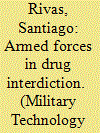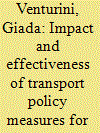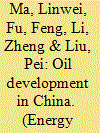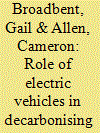|
|
|
Sort Order |
|
|
|
Items / Page
|
|
|
|
|
|
|
| Srl | Item |
| 1 |
ID:
123853


|
|
|
|
|
| Publication |
2013.
|
| Summary/Abstract |
Being one of the main illicit drug producers in the world, some Latin American countries have a very developed organization to fight against drug production and trafficking becoming an example for other regions of the world.
|
|
|
|
|
|
|
|
|
|
|
|
|
|
|
|
| 2 |
ID:
125443


|
|
|
|
|
| Publication |
2013.
|
| Summary/Abstract |
In this paper, we discuss the implications of financing constraints for future energy and climate scenarios. Aspirations to improve energy access and electrification rates in developing countries, while simultaneously reducing greenhouse gas emissions, can be seriously hindered by the availability of low-cost capital for the necessary investments. We first provide a brief description of the theoretical foundations for financing constraints in the energy sector. Then, using a broad range of alternate assumptions we introduce capital supply curves to an energy system model for Sub-Saharan Africa, with a specific focus on the power sector. Our results portray the effect of capital cost on technology selection in electricity generation, specifically how limited capital supply decreases investments to capital-intensive zero-emission technologies. As a direct consequence, the emission price required to meet given emission targets is considerably increased when compared to case that disregards the capital constraints. Finally, we discuss possible policy instruments for resolving the constraints.
|
|
|
|
|
|
|
|
|
|
|
|
|
|
|
|
| 3 |
ID:
094857


|
|
|
|
|
| Publication |
2010.
|
| Summary/Abstract |
The post-2012 climate policy framework needs a global commitment to deep greenhouse gas emission cuts. This paper analyzes reaching ambitious emission targets up to 2050, either -10% or -50% from 1990 levels, and how the economic burden from mitigation efforts could be equitably shared between countries. The scenarios indicate a large low-cost mitigation potential in electricity and industry, while reaching low emission levels in international transportation and agricultural emissions might prove difficult. The two effort sharing approaches, Triptych and Multistage, were compared in terms of equitability and coherence. Both approaches produced an equitable cost distribution between countries, with least developed countries having negative or low costs and more developed countries having higher costs. There is, however, no definitive solution on how the costs should be balanced equitably between countries. Triptych seems to be yet more coherent than other approaches, as it can better accommodate national circumstances. Last, challenges and possible hindrances to effective mitigation and equitable effort sharing are presented. The findings underline the significance of assumptions behind effort sharing on mitigation potentials and current emissions, the challenge of sharing the effort with uncertain future allowance prices and how inefficient markets might undermine the efficiency of a cap-and-trade system.
|
|
|
|
|
|
|
|
|
|
|
|
|
|
|
|
| 4 |
ID:
168646


|
|
|
|
|
| Summary/Abstract |
The unsustainable growth in global transport activity is straining planet's resources and ecosystems. Hence, there is a need to promote technological developments, regulatory instruments and social changes to reduce the impact of mobility demand on energy use and environment. The current paper aims at assessing the impact and effectiveness of transport policy measures in reaching emission reduction targets for the case of the integrated energy and transport system of Denmark. Our analysis of policy scenarios is performed in collaboration with experts, stakeholders and citizens, and facilitated by a newly developed Scenario Interface tool linked to the energy system model TIMES-DK. Market signals, in the form of taxes on CO2 and fossil fuels, retain the highest impact in lowering the carbon emissions from the transport sector, while the promotion of Mobility-as-a-Service is the most cost-effective measure among those analysed. Finally, we discuss the implications of combining instruments into policy packages and emphasise the urgency of addressing technology and policy solutions for the maritime and aviation sectors.
|
|
|
|
|
|
|
|
|
|
|
|
|
|
|
|
| 5 |
ID:
113416


|
|
|
|
|
| Publication |
2012.
|
| Summary/Abstract |
The future of oil has become an important topic of the discussion of energy policy in China. This paper attempts to present a full picture of the current status and future trends of China's oil development through system analysis. First, we map a Sankey diagram of China's oil flow to reveal the physical pattern of China's oil supply and consumption. Then, we present the historical and ongoing trends of China's oil flow from key aspects such as oil demand, oil resource availability, technology improvement, and policy adjustment. Based on these understandings, we design three scenarios of China's oil demand in 2030, and analyze policy implications for oil saving, automotive energy development, and energy security. From the analysis, we draw some conclusions for policy decisions, such as to control the total oil consumption to avoid energy security risks, to enhance oil saving in all sectors with road transportation as the emphasis, and to increase the investment on oil production and refining to secure oil supply and reduce emissions.
|
|
|
|
|
|
|
|
|
|
|
|
|
|
|
|
| 6 |
ID:
162915


|
|
|
|
|
| Summary/Abstract |
This article studies the integration of variable renewable energy sources (RES) into power networks. The main goal is to confront the contents and trends of scientific literature with the eyes and projects of researchers on future topics and issues to be solved, especially in terms of the modeling of electrical systems. The analysis relies on a bibliometric study of the Scopus database on the topic and on an online survey sent to the corresponding authors of the identified papers. The paper analyzes the dynamics of publication, clusters of collaboration, and main topics studied. It then identifies potential research leads, among which unresolved challenges regarding technical aspects, markets and financing issues, and social aspects. The disparity of models and results is still a necessary evil as research is not mature enough to integrate in one model all the very complex parameters of VRE integration into power systems. There is a lack of recurrence, though, such as the impact of emergent technologies or the development of substitute low carbon-emitting technology (other than solar and wind), need to be addressed. The paper also advocates the need for a systemic vision, for both research and policymakers that goes beyond the sole power system.
|
|
|
|
|
|
|
|
|
|
|
|
|
|
|
|
| 7 |
ID:
140519


|
|
|
|
|
| Summary/Abstract |
Power transition theory seems to imply that war between the United States and the rising China is inevitable. However, in this article it is explained that a peaceful power transition is possible. While there is uncertainty for China to successfully catch up with the United States, the future regional power transition scenarios suggest that the United States should make an effort to maintain power preponderance over China. To do that, the United States has to expand its new alliance partnerships and to efficiently manage its existing regional alliance system through its “pivot to Asia” policy. In that sense, the U.S. efforts to encourage Japan to become a “normal” state to share a larger military burden and to introduce the missile defense system in the region, including the THAAD system, to the Korean Peninsula would be helpful for the United States. In addition, inducing China to be less dissatisfied with the status quo is crucial for regional stability. The United States should encourage its allies and friends in the region to increase their economic interdependence with China and to participate actively in the China-led regional economic institutions such as the AIIB. While maintaining power preponderance, inducing China to be less dissatisfied with the status quo is one answer that the power transition theory provides for the United States to peacefully manage the era of the rising China in the region.
|
|
|
|
|
|
|
|
|
|
|
|
|
|
|
|
| 8 |
ID:
186464


|
|
|
|
|
| Summary/Abstract |
Transitioning to net-zero greenhouse gas (GHG) emissions by 2050 is becoming increasingly urgent, requiring accelerated efforts to decarbonise all economic sectors, including transport, a growing emissions source. A transition to battery electric vehicles (BEV) would accelerate the decarbonisation of road transport and provide other benefits. But in Australia, BEV uptake has been negligible, and the scale and pace required to reach net-zero emissions by 2050 has not been addressed to date.
|
|
|
|
|
|
|
|
|
|
|
|
|
|
|
|
| 9 |
ID:
052913


|
|
|
| 10 |
ID:
183431


|
|
|
|
|
| Summary/Abstract |
This paper substantiates the relevance of creating a technique of co-learning involving the training and material base of various military universities, and examines the makeup of the automated training system of interservice training based on the combat modeling system. It suggests an improved methodology of training events that employs the scenario method and system of assessment criteria for students.
|
|
|
|
|
|
|
|
|
|
|
|
|
|
|
|
|
|
|
|
|